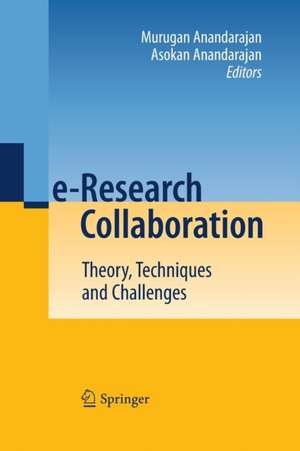e-Research Collaboration: Theory, Techniques and Challenges
Editat de Murugan Anandarajanen Limba Engleză Paperback – 13 noi 2014
| Toate formatele și edițiile | Preț | Express |
|---|---|---|
| Paperback (1) | 642.83 lei 6-8 săpt. | |
| Springer Berlin, Heidelberg – 13 noi 2014 | 642.83 lei 6-8 săpt. | |
| Hardback (1) | 649.06 lei 6-8 săpt. | |
| Springer Berlin, Heidelberg – 28 iul 2010 | 649.06 lei 6-8 săpt. |
Preț: 642.83 lei
Preț vechi: 756.27 lei
-15% Nou
Puncte Express: 964
Preț estimativ în valută:
123.02€ • 127.09$ • 102.38£
123.02€ • 127.09$ • 102.38£
Carte tipărită la comandă
Livrare economică 26 martie-09 aprilie
Preluare comenzi: 021 569.72.76
Specificații
ISBN-13: 9783642430336
ISBN-10: 3642430333
Pagini: 344
Ilustrații: XVII, 326 p.
Dimensiuni: 155 x 235 x 18 mm
Greutate: 0.49 kg
Ediția:2010
Editura: Springer Berlin, Heidelberg
Colecția Springer
Locul publicării:Berlin, Heidelberg, Germany
ISBN-10: 3642430333
Pagini: 344
Ilustrații: XVII, 326 p.
Dimensiuni: 155 x 235 x 18 mm
Greutate: 0.49 kg
Ediția:2010
Editura: Springer Berlin, Heidelberg
Colecția Springer
Locul publicării:Berlin, Heidelberg, Germany
Public țintă
ResearchCuprins
e-Research Collaboration: Theory.- An Overview of e-Research Collaboration.- An Anatomy of Collaboration Within the Online Environment.- Time, Place and Cyberspace: Foundations for Successful e-Research Collaboration.- Gaps and Bridges in Interdisciplinary Knowledge Integration.- Building a Conceptual Framework for Creating New Knowledge Through a Virtual Interdisciplinary Environment Process.- e-Research Collaboration: Technologies.- Serverless Social Software for Nomadic Collaboration.- A Taxonomy of e-Research Collaboration Tools: Using Web 2.0 to Connect, Collaborate and Create with Research Partners.- Blogging to Accelerate Peer Review of Doctoral Dissertations.- The Butterfly Effect: An Approach to Web-Based Scientific Data Distribution and Management with Linkages to Climate Data and the Semantic Web.- Collaboration Among e-Research Projects in the UK: An Analysis Using Online Research Methods.- e-Research in International Cooperation Networks in Science and Technology Research.- Wikis in Design Engineering Research.- Shifting the Research Grant Collaboration Paradigm with Research 2.0.- Doctoral Programs in the Age of Research 2.0.- e-Research Collaboration: Challenges.- Issues Related to Research Ethics in e-Research Collaboration.- The Coming “République des Lettres”.- E-Research Collaboration and the Free-Rider Problem: Communication Solutions to Social Dilemmas in Computer Mediated Research Collaborations.- Knowledge Sharing by Web 2.0 in Real Estate and Construction Discipline.- Creation of Social Capital in a Web Based Virtual Research Environment.
Textul de pe ultima copertă
Research in both academic and non-academic circles has remained virtually identical in its conduct and organization over the last few decades. Disparate groups of researchers have worked on their ideas, projects and inventions in isolated clusters, with little sharing of information and synergies from collaboration. The advent of social networks and Web portals such as MyNetResearch have led to the creation of new research networks that dramatically reduces the barriers and obstacles to collaboration by researchers who are geographically, organizationally and disciplinarily distant.The current tens of thousands and eventually millions of researchers who will use research networks are ushering in a new paradigm for research. In this paradigm collaboration is made much easier, sharing of research knowledge is instant, and synergies from routine collaboration will yield huge advances in research productivity and innovation. This book examines how research networks are changing the practice of research and decide how best to embrace such technologies and use them to their best advantage.
Caracteristici
Describes on how Web 2.0 technologies can help researchers collaborate With examples of web portals include MyNetResearch.com Discusses aspects of research management, research awareness, research networking, and research tools, which is critial for the success of the 21st century researcher

